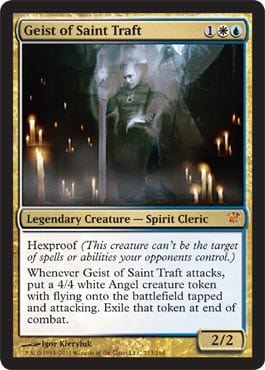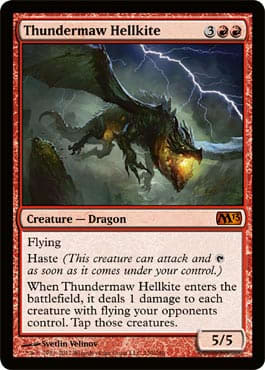The holidays are fast approaching, and for the Magic community, that typically means a much needed break from this game we so love. This year, it seems Wizards of the Coast has decided a Grand Prix and Pro Tour Qualifier in my area were the best ways to celebrate the holidays, and although I will be spending Christmas with my family, I plan on grinding right up until that day. So, what do the holidays and Magic have in common outside a few bad-beats stories? Well, I was pondering this question for the past few days, and I realized that much like the spirit of Christmas in the Charles Dickens novel A Christmas Carol, Magic also has a few tales to tell. This week, I am going to be looking at what you could call the evolution of the trade game and where I think the future lies.
Like Dickens’s dark tale, Magic trading in the past starts on a less foreboding note. When I first started getting into the trade game when I was twelve or so, I found it very easy to gain value in almost every trade because people did not have the tools we use now to appropriate value. In my younger years, I can remember being able to visit almost any local shop and pick through bulk-rare boxes or commons and uncommons and walk out of the shop with a few hundred dollars’ worth of cards for just a fraction of their cost.
Trading in these days was no different—I found myself able to stay ahead of the curve very easily, and over the course of a few years with no money invested, I had built a sizable collection. At this point in my life, I was using my skills to keep play stock available and have some extra money on the side. As a few years passed and I had all I needed to play with, I became very focused on the money, and in turn, I began to do everything I could to have more. I never stole, but I did do some less-than-desirable trades that I knew were not going to make the other people happy if they were ever wise enough to look up the prices. As I said, though, at this point, all I cared about was that I had found a way, without a job, to make enough money to go out with my friends and enjoy life.
As a few more years set in and I had a better grasp of what money actually meant and people began to understand their cards were worth something, I began to find things slowing down. At this point, I was struggling so hard to try to find those value trades that I was blind to the facts that I have since realized. In turn, I was not able to evolve my trade game; it was still all about the Benjamins.
As I progressed into a relationship and found myself filling out college applications and being tied up with a real-world job, I began to realize I no longer had the time to travel or keep up with prices. I began to look at trading in a different light and extinguished my prior self, abandoning my younger trade tactics!
Flash forward a few years to my later college days; I had just been laid off from my second engineering job in the past three years due to the economy, and money was tight. I had been sporadically making major events the entire time, but by no means were my trade skills as sharp as they had once been. With the need for some extra spending money, I decided to dedicate myself once again to this great game as just a trader—no longer a player.
I have spent the past few years making a name for myself in the trade world through both writing and podcasting while also attending a far greater number of larger events. I have reconnected with all my old contacts in the business and have learned that the trade game as I knew it when I was a kid is all but dead.
With the advancement of technology, it is far more difficult to attempt to grind actual monetary value out of someone unless you are dealing in high-end or hard-to-find goods such as Power Nine and foreign foils. As much as you can still profit from these cards, you also have a far higher risk of being burned if the market takes a dive suddenly on a particular deck or archetype and you’re suddenly stuck with a bunch of cool-looking cards that no one wants to touch.
With this knowledge and my understanding of percentages, I also learned how to use the known buy list to my advantage. The key to trading currently if you are looking to cash out is to find the highest percentage cards on a particular list and target those. This does not mean the highest value, per se, but instead, if you see that a $2 card is being cashed out for $1.50 and you can turn your $60 card that is cashing out at $40 into thirty copies, it only makes sense to do so.
Beyond knowing the cash-out numbers and niche markets, I have also found that there is a much bigger emphasis on collections when you are looking to make value from this game. Buying cards and flipping them for a small profit will sustain your lifestyle if you do it properly, but in order to grow in wealth and business, you need to learn how to evaluate collections. This is a skill that I have discussed multiple times throughout the past year, and it’s something I cannot stress enough going forward.
So now that I am in a position of the public eye and I have a successful business, where do I go moving forward from here? In the next year, I am looking to start doing my own shows as well as work for other vendors as I have done in the past. Part of breaking into this community is making friends. Just like how pros stay on top through playtesting and sharing information, vendors also remain the same through similar means. There is no way to be booted from this business faster than to build a scummy reputation as a trader or dealer, and if you do manage to earn that title, you can expect the full force of all the other vendors to come crashing down on you. The trade game and dealer game has become less about survival of the fittest and more about cooperation and adjustment. You may think all of those vendors at a Grand Prix are out on their own, but the truth is that most of them will be hitting the bar together or sharing stories of the day over dinner just like the players. Dealing is no longer just a way to make money, it has become a community.
So looking forward, what do I expect from the trade community in the years to come? Speculating has become a big deal in the recent weeks on Twitter, and people are worried that it may ruin the market in the coming times. I do not worry myself with such things, as I have seen what this game can weather, and anyone who is worried about the market suddenly drying up of dual lands has not been to a Grand Prix recently—they are in everyone’s binders, and all the dealers have ample in stock.
As we progress forward, I believe the real concern for value traders is finding where their place will be in this new community. Those who have not made the proper friends will probably be dredged to the side as the savvy traders make their allies. I believe the community is as high in numbers currently as we will probably ever see it because of the sudden spotlight trading has obtained in the past few years. I am just as guilty as any for this recent occurrence, and I will not apologize at all. I believe it is better for the community as a whole for people to be informed about the prices of individual cards and of their collections. Those who are wise will still find ways to make money, whether by moving into retail or eBay or else by finding another other niches they feel they can fill.
For now, though, the trade floors have become the Wild West, as all the wanna-be sharks are trying to find prey and instead seem to only attempt to snack on each other. Even the most hardcore of players have turned to trading as a way to fuel their habits, and although I am happy to see people attempting to make their hobby pay for itself, I also understand that this pool is only so big. I am not saying people should stop trying to value trade or that it is bad for everyone to have a binder, but I think people need to be aware that you don’t always have to make immediate value.
Learning how to identify cards when they are on lulls or how to dump them when they are at their peaks will allow you to play the market all the while your trade partner has his smartphone at the ready. There is no need to deceive or grind in this game anymore, and although people will still try, I don’t expect those are the people I will see on the trade tables three or four years from now. Evolving as a trader, no matter which direction you take it, is necessary to remain on top of this ever-changing game.
Before I depart, I want to list a few cards you may want to look at dumping or picking up in the next few weeks. I don’t have details this week, but as I mentioned last week, you should be doing your own research anyway, so this is just a guideline.
Pick-ups:
Dumps:
I hope you enjoyed this Christmas edition of the financial column here at GatheringMagic.com. These types of articles are always enjoyable for me to write, so I hope you also had a good time reading about my past, present, and future. Have a great holiday season, and remember there is more than money in this game!
Ryan Bushard























